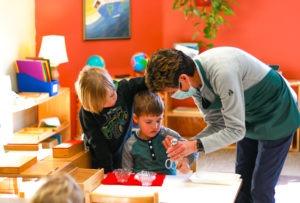
Hands-on learning is an instructional technique that engages in practical activities and exercises. Hands-on learning is a form of experiential learning. The approach allows a child to explore different materials and learn through experimentation.
Children learn through different modes, but most learning is visual and auditory. Therefore, hands-on learning allows children to learn skills informally before entering formal education. Read on to discover other benefits of hands-on learning.
Fun and Engaging
Learning by doing is a common theme in childhood education. Learning by doing far outweighs traditional learning. Sitting in class and listening to a teacher quickly becomes boring for children.
Children develop skills faster when they are having fun. Breaking up the monotony of bookwork keeps children motivated and interested in learning.
Allowing children to learn the alphabet through clay molding opens up the learning process. The molding exercise makes alphabet learning enjoyable and encourages interactivity.
Experiential learning helps encourage collaboration between learners and engagement with the learning material. Children are different, and bringing them together in a safe education environment allows them to bond.
Furthermore, learning activities such as playing a musical instrument accelerates and encourages language development. The collaborative activities foster children to learn new vocabulary. The activities also encourage children to express themselves and describe materials around them.
Improved Memory Retention
Besides better engagement, hands-on learning allows children to practice the skills they learn. The hands-on experience will enable children to make important discoveries independently.
Learnings aids help children create a connection between feelings and the thinking process. The connection concept holds for primary-age learners and adults as well. As a result, children learn and understand complex concepts more successfully.
Additionally, a hands-on approach makes learning a multisensory experience. Activities that involve smell, taste, sight, and touch enhance children learning. Handling objects deepens a lesson beyond a piece of paper for better understanding. Exploring materials such as sand, paint, and water helps children remember more effectively.
Such hands-on experiments give children the actual practice of abstract concepts. The exercises increase children’s skill level and knowledge retention.
Stronger Fine Motor Skills
Fine motor skills develop from infancy when grasping parents’ fingers and toys. Fine motor skills are essential for hand-eye coordination and the use of tools.
During early school years, children develop fine motor skills through class activities. Cultured motor skills set up your child for academic, social, and personal success.
In preschool, class activities like sorting help develop and refine kids’ motor skills. As children develop these skills, they become more adept at real-world tasks such as tying shoelaces and brushing their teeth.
The exercises boost your child’s confidence and independence from an early age. Research has shown that improved fine motor control results in increased cognitive abilities of a child.
Allows for Creativity
Creativity is a process that sparks unique ideas and fuels the products like art or thought-provoking writing. Hands-on learning allows for creativity that is not possible through traditional education.
Hands-on learning in the early childhood years encourages children to think and act freely. This freedom allows children to explore their imagination and innovate around it. Hands-on learning also promotes creative problem solving and the freedom to make mistakes.
Hands-on learning has a unique approach to childhood development. Hands-on learning appeals to children. It entertains them while helping develop their potential capabilities. However, keep in mind that hands-on learning is not the same for every child. Some kids learn best with more movement and exploration, while others learn more effectively sitting at a desk or table.
Contact us at Miniapple International Montessori School today to schedule an on-site or virtual tour of our school.

